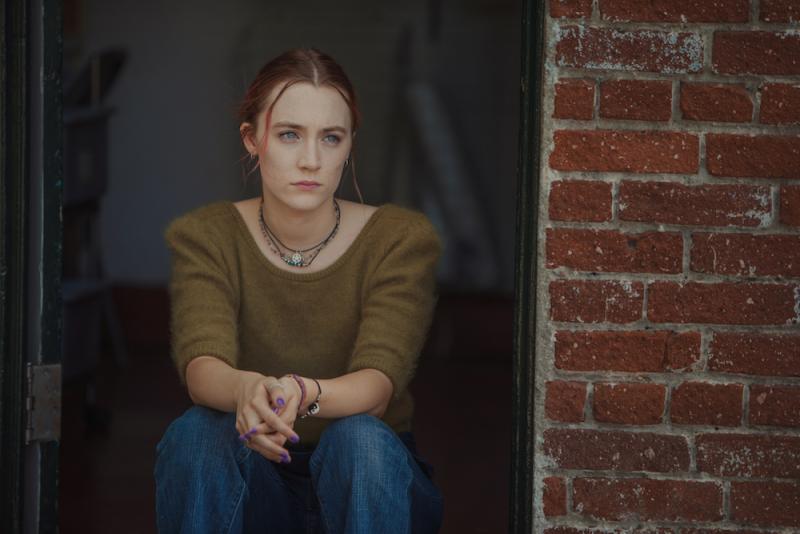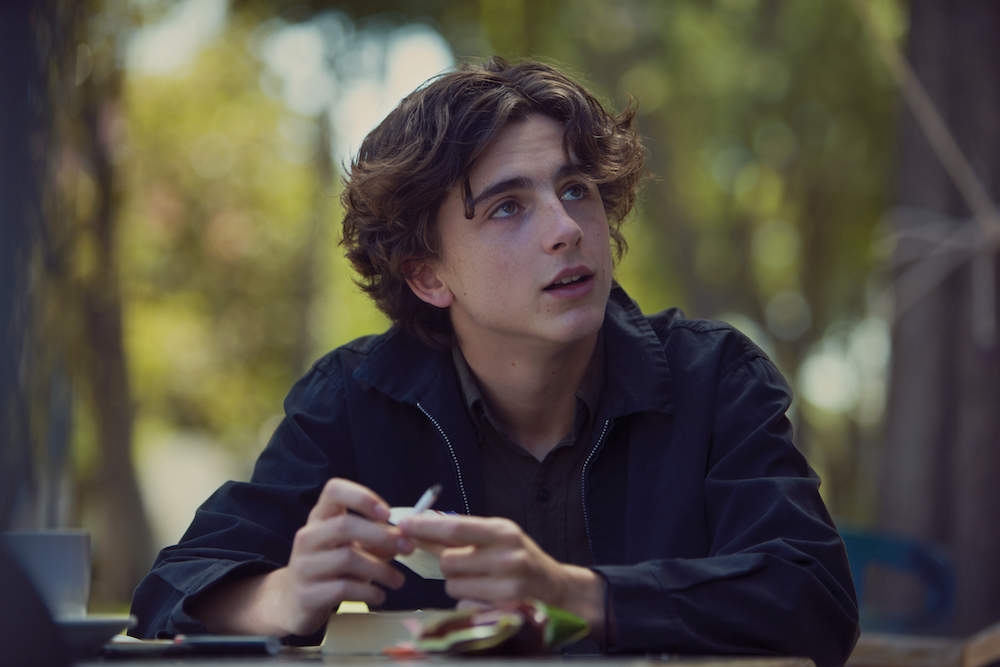Lady Bird review - Greta Gerwig's luminous coming-of-age movie | reviews, news & interviews
Lady Bird review - Greta Gerwig's luminous coming-of-age movie
Lady Bird review - Greta Gerwig's luminous coming-of-age movie
An uncynical and beautifully observed directorial debut

Greta Gerwig, in her hugely acclaimed, semi-autobiographical directing debut (a Golden Globe for best director, five Academy Award nominations) opens Lady Bird with a Joan Didion quote: “Anyone who talks about California hedonism has never spent a Christmas in Sacramento.”
Brits may well think the place doesn’t look that bad, what with all the sunshine, big houses and swimming-pools, but 17-year-old Lady Bird (a delicate, acne-scarred Saoirse Ronan in a brilliant performance), who describes it as the mid-west of California, is keen to get the hell out of there. She longs to go college in New York “where culture is,” as she tells her mother, Marion (the impressive Laurie Metcalf, a mainstay on Roseanne for decades), or at least Connecticut or New Hampshire, where “writers live in the woods”.
Class and money are major themes, though always in a minor key
This is 2002 and although Lady Bird (real name Christine; with typical feistiness she tells a priest at her Catholic school that Lady Bird is her given name, “Given to me by me”) doesn’t get good grades, she reckons that maybe 9/11 will improve her chances of getting in to NYU as applications are down due to terrorism. She is at odds, as teenagers are, with her mother, a hard-working nurse, who’s always reminding her how poor the family is and nagging at her to tidy her room, but they’re still close and Marion is desperate for her daughter to stay in California. Her much more laid-back dad (Tracy Letts) is keen to help out with loans for her East Coast aspirations, even though he’s lost his job and is struggling with depression.
Gerwig has co-written (and starred in) other films – Frances Ha and Mistress America with Noah Baumbach – but this is the first to be entirely written by her. It’s full of affection for her home town, though a bit short on specific details – you don’t get much a feel for the place apart from underwhelming views of bridges, highways and parking lots, but maybe that’s the point – and for Christine’s lovably imperfect family. Her adopted older brother (Jordan Rodrigues) – the adoption part is, confusingly, never spelled out: from interviews, it’s clear that Gerwig knows the backstory and we don’t – and his girlfriend Shelly (newcomer Marielle Scott), are also living at home. Both are heavily pierced (“You’ll never get real jobs with those things in your faces,” Christine tells them in a moment of rage) and working at the local supermarket, trying to find employment after graduating from Berkeley. Sometimes it all feels too glowingly whimsical, a bit Little Miss Sunshine, and there are flabby moments, especially in the relationship between Christine and her dad. Her mother’s harshness (she tells her daughter that because she looks like trash, this will affect her father’s employment chances) sometimes seems exaggerated and off-key. But there are so many excellent performances that you’re carried along: Lucas Hedges as her sweet first boyfriend, whose grandmother lives in Christine’s dream house on the right side of the tracks (class and money are major themes, though always in a minor key); Timothée Chalamet (star of Call Me By Your Name) as her super-cool, careless second one (pictured above). He’s prone to such statements as “I’m trying to live by bartering and not participate in the economy,” and talks about Iraq just after they've had sex for the first time. “Different things can be sad. It’s not all war,” retorts Christine.
Sometimes it all feels too glowingly whimsical, a bit Little Miss Sunshine, and there are flabby moments, especially in the relationship between Christine and her dad. Her mother’s harshness (she tells her daughter that because she looks like trash, this will affect her father’s employment chances) sometimes seems exaggerated and off-key. But there are so many excellent performances that you’re carried along: Lucas Hedges as her sweet first boyfriend, whose grandmother lives in Christine’s dream house on the right side of the tracks (class and money are major themes, though always in a minor key); Timothée Chalamet (star of Call Me By Your Name) as her super-cool, careless second one (pictured above). He’s prone to such statements as “I’m trying to live by bartering and not participate in the economy,” and talks about Iraq just after they've had sex for the first time. “Different things can be sad. It’s not all war,” retorts Christine.
And there are lots of laughs: she and her best friend Julie (the wonderful Beanie Feldstein) lying on the floor, giggling and eating communion wafers straight from the jar; Christine’s fury at being given the non-speaking part of “Tempest” in the school production of The Tempest; her misplaced confidence in her maths ability. When she briefly goes over to the dark side, seduced by the allure of gorgeous, popular, moronic Jenna (Odeya Rush) whose horizons don’t extend beyond Sacramento, you feel Julie’s pain, and also Christine’s.
Against the odds (and it means remortaging the house) Christine does get into college in New York and the film becomes a farewell to childhood, with a wrenching scene at the airport as her mother struggles with the loss. We see Christine partying in Greenwich Village, drinking too much, giving up that given name of hers and seeing Sacramento through new, more thankful eyes. Not ground-breaking territory, but, as one of the kindly nuns tells Christine, love is all about paying attention.
The future of Arts Journalism
You can stop theartsdesk.com closing!
We urgently need financing to survive. Our fundraising drive has thus far raised £49,000 but we need to reach £100,000 or we will be forced to close. Please contribute here: https://gofund.me/c3f6033d
And if you can forward this information to anyone who might assist, we’d be grateful.

Subscribe to theartsdesk.com
Thank you for continuing to read our work on theartsdesk.com. For unlimited access to every article in its entirety, including our archive of more than 15,000 pieces, we're asking for £5 per month or £40 per year. We feel it's a very good deal, and hope you do too.
To take a subscription now simply click here.
And if you're looking for that extra gift for a friend or family member, why not treat them to a theartsdesk.com gift subscription?
more Film
 Bugonia review - Yorgos Lanthimos on aliens, bees and conspiracy theories
Emma Stone and Jesse Plemons excel in a marvellously deranged black comedy
Bugonia review - Yorgos Lanthimos on aliens, bees and conspiracy theories
Emma Stone and Jesse Plemons excel in a marvellously deranged black comedy
 theartsdesk Q&A: director Kelly Reichardt on 'The Mastermind' and reliving the 1970s
The independent filmmaker discusses her intimate heist movie
theartsdesk Q&A: director Kelly Reichardt on 'The Mastermind' and reliving the 1970s
The independent filmmaker discusses her intimate heist movie
 Blu-ray: Wendy and Lucy
Down-and-out in rural Oregon: Kelly Reichardt's third feature packs a huge punch
Blu-ray: Wendy and Lucy
Down-and-out in rural Oregon: Kelly Reichardt's third feature packs a huge punch
 The Mastermind review - another slim but nourishing slice of Americana from Kelly Reichardt
Josh O'Connor is perfect casting as a cocky middle-class American adrift in the 1970s
The Mastermind review - another slim but nourishing slice of Americana from Kelly Reichardt
Josh O'Connor is perfect casting as a cocky middle-class American adrift in the 1970s
 Springsteen: Deliver Me From Nowhere review - the story of the Boss who isn't boss of his own head
A brooding trip on the Bruce Springsteen highway of hard knocks
Springsteen: Deliver Me From Nowhere review - the story of the Boss who isn't boss of his own head
A brooding trip on the Bruce Springsteen highway of hard knocks
 The Perfect Neighbor, Netflix review - Florida found-footage documentary is a harrowing watch
Sundance winner chronicles a death that should have been prevented
The Perfect Neighbor, Netflix review - Florida found-footage documentary is a harrowing watch
Sundance winner chronicles a death that should have been prevented
 Blu-ray: Le Quai des Brumes
Love twinkles in the gloom of Marcel Carné’s fogbound French poetic realist classic
Blu-ray: Le Quai des Brumes
Love twinkles in the gloom of Marcel Carné’s fogbound French poetic realist classic
 Frankenstein review - the Prometheus of the charnel house
Guillermo del Toro is fitfully inspired, but often lost in long-held ambitions
Frankenstein review - the Prometheus of the charnel house
Guillermo del Toro is fitfully inspired, but often lost in long-held ambitions
 London Film Festival 2025 - a Korean masterclass in black comedy and a Camus classic effectively realised
New films from Park Chan-wook, Gianfranco Rosi, François Ozon, Ildikó Enyedi and more
London Film Festival 2025 - a Korean masterclass in black comedy and a Camus classic effectively realised
New films from Park Chan-wook, Gianfranco Rosi, François Ozon, Ildikó Enyedi and more
 After the Hunt review - muddled #MeToo provocation
Julia Roberts excels despite misfiring drama
After the Hunt review - muddled #MeToo provocation
Julia Roberts excels despite misfiring drama
 Ballad of a Small Player review - Colin Farrell's all in as a gambler down on his luck
Conclave director Edward Berger swaps the Vatican for Asia's sin city
Ballad of a Small Player review - Colin Farrell's all in as a gambler down on his luck
Conclave director Edward Berger swaps the Vatican for Asia's sin city
 London Film Festival 2025 - Bradley Cooper channels John Bishop, the Boss goes to Nebraska, and a French pandemic
... not to mention Kristen Stewart's directing debut and a punchy prison drama
London Film Festival 2025 - Bradley Cooper channels John Bishop, the Boss goes to Nebraska, and a French pandemic
... not to mention Kristen Stewart's directing debut and a punchy prison drama

Add comment